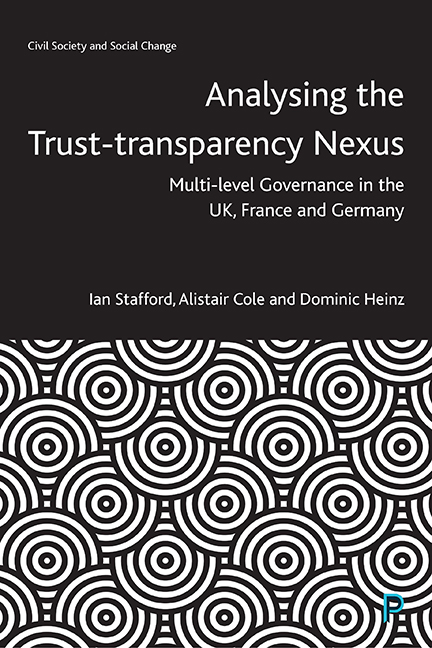Book contents
- Frontmatter
- Dedication
- Contents
- List of figures and tables
- List of abbreviations
- About the authors
- Acknowledgements
- Introduction
- 1 Building trust in an age of transparency
- 2 The trust–transparency nexus
- 3 Comparing cases
- 4 UK: North West England and Wales
- 5 Germany: Hesse and Saxony-Anhalt
- 6 France: Auvergne-Rhône-Alpes and Bretagne
- Conclusion: reflections on the trust–transparency nexus
- Appendix: qualitative fieldwork guide
- References
- Index
Conclusion: reflections on the trust–transparency nexus
Published online by Cambridge University Press: 15 September 2022
- Frontmatter
- Dedication
- Contents
- List of figures and tables
- List of abbreviations
- About the authors
- Acknowledgements
- Introduction
- 1 Building trust in an age of transparency
- 2 The trust–transparency nexus
- 3 Comparing cases
- 4 UK: North West England and Wales
- 5 Germany: Hesse and Saxony-Anhalt
- 6 France: Auvergne-Rhône-Alpes and Bretagne
- Conclusion: reflections on the trust–transparency nexus
- Appendix: qualitative fieldwork guide
- References
- Index
Summary
The health of trust – in its various configurations and conceptualisations – and questions as to whether it is in decline, have been a consistent feature of academic research across a wide range of disciplines since the 1960s. Interest has often centred on assessing the impact of specific events or crises on the state of trust, for example, the 2007–8 financial crisis and the rise of populism across the world (Ziller and Schübel, 2015; Algan et al, 2017; Hosking, 2019; Geurkink et al, 2020). The COVID-19 pandemic which engulfed the world from early 2020 sparked further interest in trust-related research, as Devine and colleagues (2021: 276) note, in terms of the impact of the presence or absence of trust on government responses to the pandemic, but also the impact of the pandemic itself on trust. A key feature of this wideranging literature has been attempts to understand the role that political trust performs and the impact of its presence or absence. For example, Devine and colleagues (2020: 2) note the key distinction between trust, mistrust and distrust. They point to the characterisation provided by van der Meer and Zmerli (2017: 1) that trust plays the dual role as the ‘glue that keeps the system together’ and the ‘oil that lubricates the policy machine’, and mistrust or ‘political scepticism’ can underpin engagement and accountability. The key challenge occurs when this mistrust evolves into feelings of distrust towards the political system, threatening disengagement and disorder. A further feature of this literature, and perhaps almost more important given the dominant contemporary narrative, has been the search for mechanisms or processes that can help rebuild or restore trust. It is within this space that the research on civil society outlined within this book was situated, and specifically given the existing literature's primary focus on the national level, whether these themes vary as much within states as between them.
The primary objective of the project outlined in this book was to analyse the dynamics between trust and transparency – the trust–transparency nexus – in a comparative context, examining the extent to which these dynamics may differ as much within states as between them. Although the fieldwork was completed before the COVID-19 pandemic, the nuances of the trust–transparency nexus and the importance of contextual factor highlighted in Enria and colleagues’ (2021) work, also resonated in our fieldwork.
- Type
- Chapter
- Information
- Analysing the Trust-Transparency NexusMulti-level Governance in the UK, France and Germany, pp. 143 - 153Publisher: Bristol University PressPrint publication year: 2022



